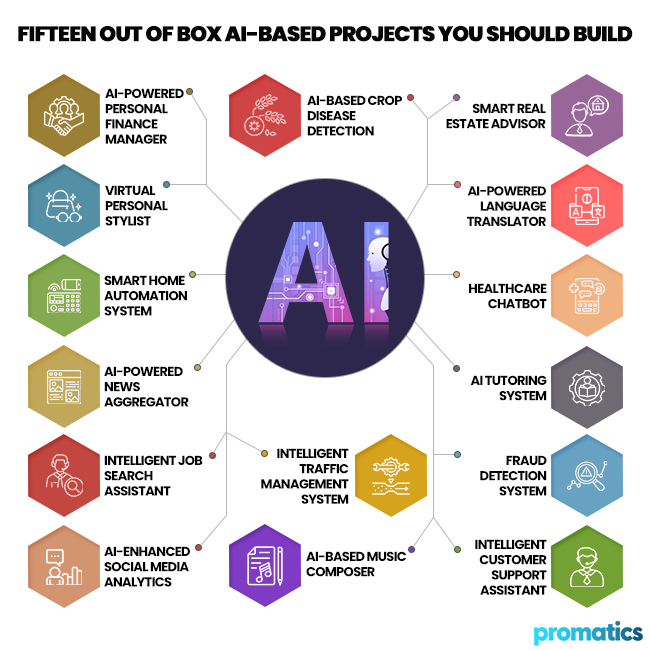Fifteen Out-of-the-Box AI-Based Projects You Should Build
Artificial Intelligence (AI) has revolutionized various industries, making it an exciting field for developers and enthusiasts. Building AI-based projects enhances your skills and offers the potential to captivate a significant user base.
This article explores fifteen out-of-the-box AI-based project ideas from diverse domains such as real estate, education, healthcare, and more. These projects leverage AI algorithms and techniques to solve complex problems, automate tasks, and provide valuable insights. Whether you’re a seasoned developer or just starting, these projects offer a fantastic opportunity to dive into AI and showcase creativity.
1. Smart Real Estate Advisor
Real estate is an expansive industry that often presents challenges when finding the ideal property. However, by building an AI-powered application, these challenges can be mitigated.
This application can utilize various AI technologies such as natural language processing (NLP), computer vision, and machine learning algorithms to recommend properties tailored to individual user preferences, budgets, and desired locations. With NLP, the application can understand user queries and extract relevant information.
Computer vision can analyze property images to gather additional details, while machine learning algorithms enable the generation of personalized recommendations based on user data. By leveraging these AI technologies, the application streamlines the real estate search process, making it easier for users to find their perfect property.
2. AI Tutoring System
An AI-powered tutoring system has the potential to revolutionize the way students learn. This system can gain insights into students’ strengths, weaknesses, and learning styles by implementing machine learning algorithms.
With this understanding, the system can generate personalized lesson plans tailored to each student’s needs. Interactive quizzes can be provided to engage students and assess their progress, while real-time feedback can be offered to guide them toward improvement.
By harnessing the power of AI, this tutoring system enhances the learning experience by providing customized support and adapting to the unique requirements of each student, ultimately promoting more effective and efficient learning outcomes.
3. Healthcare Chatbot
Developing an AI chatbot for health-related queries can benefit users seeking instant assistance. The chatbot can comprehend and interpret user questions accurately by incorporating natural language understanding (NLU) and machine learning.
It enables it to provide appropriate responses, including first-aid recommendations for common ailments, suggestions for nearby healthcare providers, and assistance in monitoring personal health conditions.
The chatbot can offer personalized and reliable information through AI, guiding users toward appropriate healthcare resources and empowering them to make informed decisions about their well-being. With its round-the-clock availability and quick responses, the AI chatbot enhances accessibility to healthcare information and support, fostering better health outcomes and user satisfaction.
4. AI-Powered Language Translator
Language barriers pose a significant challenge to effective communication, but an AI-powered language translator can help bridge this gap. By leveraging advanced natural language processing (NLP) techniques, speech recognition, and machine translation algorithms, this project aims to provide accurate and seamless translations of text or speech between multiple languages.
The NLP techniques enable the system to understand the nuances of different languages, while speech recognition allows for real-time translation of spoken words. Machine translation algorithms ensure the accuracy of the translations provided.
By harnessing the power of AI, this language translator facilitates smooth and effective cross-language communication, fostering collaboration and understanding and breaking down barriers in our increasingly globalized world.
5. Fraud Detection System
Fraud poses a constant threat across various domains, requiring robust solutions. Developing an AI-based fraud detection system can significantly bolster defense mechanisms. This system can effectively identify fraudulent transactions, suspicious activities, and potential cybersecurity threats by leveraging machine learning algorithms. Anomaly detection techniques can detect unusual patterns or behaviors that deviate from standard patterns, while pattern recognition enables the system to identify common fraud patterns.
Additionally, predictive modeling techniques can be used to anticipate future fraudulent activities based on historical data. By incorporating these AI technologies, the fraud detection system enhances its capabilities, providing organizations with the ability to proactively detect and prevent fraudulent activities, safeguard their assets, and maintain the trust of their customers.
6. Intelligent Customer Support Assistant
Organizations can enhance their customer support capabilities in today’s customer-centric world by creating an AI-based customer support assistant. This assistant can handle common queries, providing prompt and accurate responses. Leveraging natural language processing, the assistant can understand and interpret user queries.
Sentiment analysis allows the system to gauge customer emotions and respond empathetically. Dialogue management techniques enable the assistant to maintain context throughout the conversation, ensuring a seamless customer experience.
7. AI-Powered Personal Finance Manager
Managing personal finances is a common challenge for many individuals. However, this burden can be alleviated by building an AI-powered personal finance manager.
This finance manager can track expenses, categorize transactions, and analyze spending patterns using data analysis techniques. By incorporating predictive modeling, the system can forecast future costs and income, enabling users to plan their budgets more effectively.
Additionally, the manager can generate personalized budgeting suggestions based on individual financial goals and preferences. Leveraging natural language generation, it can provide insightful financial advice, helping users make informed decisions.
Through AI, this personal finance manager empowers individuals to take control of their finances, optimize their spending, and work towards their financial objectives confidently.
8. Virtual Personal Stylist
Fashion and personal style are deeply subjective, making it challenging to provide personalized fashion suggestions. However, valuable fashion advice can be offered by developing an AI-based virtual personal stylist.
This system can analyze users’ fashion preferences, body types, and occasions to recommend suitable outfits. Leveraging computer vision and image recognition, the stylist can understand and interpret clothing items, styles, and trends.
Recommendation algorithms can then generate personalized outfit suggestions based on individual preferences and requirements. By utilizing these AI technologies, the virtual personal stylist creates a customized and engaging styling experience for users, empowering them to explore new fashion choices and confidently enhance their unique style.
9. Smart Home Automation System
Transforming homes into intelligent and automated spaces is made possible through an AI-based home automation system. By integrating AI algorithms, sensors, and smart devices, routine tasks can be automated, energy consumption can be monitored, and security can be enhanced.
Machine learning algorithms enable predictive automation, learning user patterns and adjusting settings accordingly. Computer vision technology can be used for object recognition, allowing the system to identify and interact with various devices and objects.
Natural language processing enables voice commands, allowing the users to control their smart home through voice interactions. Combining these AI technologies, the home automation system offers convenience, energy efficiency, and improved security, making everyday living more comfortable and efficient.
10. AI-Powered News Aggregator
Keeping up with the latest news can be overwhelming due to the vast information available. However, an AI-powered news aggregator can streamline this process by curating news articles based on users’ interests and preferences. By leveraging natural language processing (NLP), the aggregator can understand and analyze the content of news articles.
Topic modeling techniques enable the system to categorize news articles into relevant topics, ensuring personalized recommendations. Additionally, sentiment analysis can gauge the sentiment expressed in articles, allowing users to filter news based on positive or negative views.
Through the power of AI, this news aggregator offers a tailored news experience, providing users with relevant and summarized news articles that align with their interests and preferences.
11. AI-Based Music Composer
Unlock your creative potential with an AI-based music composer that opens the doors to endless possibilities. By harnessing deep learning techniques like recurrent neural networks or generative adversarial networks, this project allows for the generation of original compositions tailored to user preferences.
The AI composer can learn from vast music datasets, understanding patterns and structures to create unique melodies, harmonies, and musical pieces. Whether you’re looking for a soothing melody or an energetic composition, the AI composer can adapt to your desired style and genre.
By merging the power of AI and music, this project encourages artistic exploration, pushing the boundaries of creativity and offering a new avenue for musical expression.
12. Intelligent Job Search Assistant
Navigating the job market can be overwhelming, but an AI-powered job search assistant can simplify the process. By developing this assistant, candidates can be matched with suitable job opportunities that align with their skills, qualifications, and preferences. This project incorporates various AI technologies such as resume parsing, job recommendation algorithms, and natural language understanding.
Resume parsing allows the assistant to extract relevant information from resumes, enabling a more accurate assessment of candidates’ qualifications. Job recommendation algorithms utilize this information to suggest suitable job openings tailored to each candidate’s profile.
Natural language understanding enhances the assistant’s ability to comprehend user queries and provide personalized recommendations. By leveraging AI, the job search assistant streamlines and optimizes the job search process, helping candidates find their ideal career opportunities more efficiently.
13. AI-Enhanced Social Media Analytics
Social media platforms’ tremendous data generates valuable insights for businesses and marketers. This data can be effectively harnessed by building an AI-enhanced social media analytics tool. Leveraging natural language processing (NLP), the device can analyze user behavior, sentiment, and trends by extracting and processing text-based content.
Sentiment analysis techniques enable the device to gauge the view expressed in social media posts, comments, and reviews, providing an understanding of public opinion. Additionally, data visualization techniques can be employed to present these insights in a visually appealing and digestible manner.
By incorporating AI technologies, this social media analytics tool empowers businesses and marketers to make data-driven decisions, understand customer sentiments, identify emerging trends, and enhance their social media strategies for improved engagement and success.
14. AI-Based Crop Disease Detection
The agricultural industry identifies and diagnoses crop diseases to sustain global food production. This project develops an AI-based system that utilizes computer vision to analyze plant images and accurately detect signs of infections.
Machine learning algorithms train the system using extensive datasets, enabling precise diagnosis. Early disease detection allows farmers to take timely action, reducing crop damage and optimizing yield.
Additionally, the system helps reduce pesticide usage, promoting sustainable agricultural practices. By enhancing productivity and minimizing losses, this project provides substantial benefits to the farming community and the global food supply chain.
15. Intelligent Traffic Management System
This AI-powered traffic management system can be developed. This system aims to optimize traffic flow, alleviate congestion, and enhance road safety by utilizing real-time data, image analysis, and predictive modeling.
The project may involve computer vision techniques for vehicle detection, reinforcement learning algorithms for traffic signal optimization, and data analytics for traffic prediction.
By harnessing the power of AI, this traffic management system can contribute to smoother traffic operations, improved commute times, and a safer driving experience for all road users.
Conclusion
AI-based projects offer a chance to showcase creativity and solve real-world problems. These fifteen ideas span various industries and attract a significant user base. Regardless of the field, such as real estate, education, or healthcare, these projects utilize AI algorithms to provide meaningful solutions and personalized experiences. Start your AI journey today, bringing innovation and substantially impacting your chosen domain.
Still have your concerns?
Your concerns are legit, and we know how to deal with them. Hook us up for a discussion, no strings attached, and we will show how we can add value to your operations!

